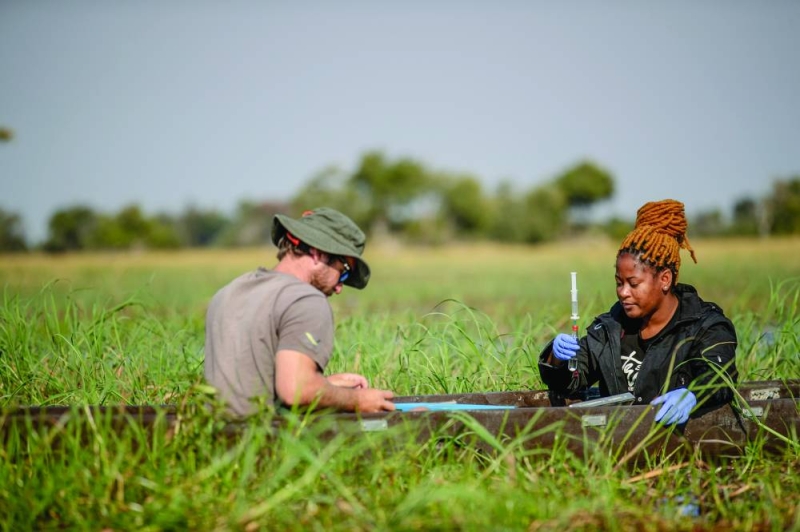Ramatlapeng: Working to save the Okavango Delta
Goitsemodimo Kaelo | Sunday August 20, 2023 06:00


Arts & Culture: Firstly, can you tell us about yourself, who is Goabaone Ramatlapeng?
Ramatlapeng: I am a Geoscientist from Botswana who is currently pursuing her PhD in Earth and Planetary Sciences at the University of California, Davis, USA. I was born and raised in Botswana.
I grew up in Kopong village, which is where I attended my primary and junior secondary schools before moving on to Moeding College in Otse. After passing my BGCSE I got admitted to the Botswana International University of Science and Technology (BIUST) in 2013 to pursue BSc in Geology in the Department of Earth and Environmental Sciences.
I graduated from BIUST in February of 2018. Later in 2018 I started my graduate school journey in the USA. My research area is Hydrochemistry and Water Resources. It focuses on investigating the processes controlling the spatial and temporal changes in the water chemistry of rivers in arid watersheds. Specifically, I investigate the processes controlling the water chemistry of the Okavango River flowing through the Okavango Delta in semi-arid Botswana. This research is crucial for ecosystem sustainability, water conservation and protection of rivers and inland deltas in arid and semi-arid environments where water scarcity is a major challenge. The research is also instructive for water quality assessment and informing water management decisions by the tri-country (Namibia, Angola and Botswana) of the Okavango River Basin.
Arts & Culture: You were recently named among the recipients of the 2023 Wayfinder Awards. How did this come about and how did you receive the news? Ramatlapeng: Yes, I was recently named as a recipient of the 2023 National Geographic Society Wayfinder Award. “The Wayfinder Award recipients are individuals who have proven themselves to be the next generation of influential leaders, communicators, and innovators whose critical work inspires us to learn about, care for, and protect the wonder of our world. Their groundbreaking work covers a vast array of impact-driven projects including connecting youth to the ocean, using innovative technology to track insects across landscapes, investigating critical environmental stories, and developing equitable conservation solutions for poor communities”-National Geographic. I feel great to have been granted the 2023 National Geographic Society WayFinder Award! Such an honor to be recognized by the National Geographic Society in this way. The award means a lot to me as it recognizes the impact of the work that I am doing that helps preserve one of the world’s largest freshwater wetlands, the Okavango Delta! The award will definitely go a long way in supporting my work and I look forward to continuing this impactful work.
Arts & Culture: You are investigating the processes controlling the water chemistry of the Okavango Delta in Botswana. What does this entail? Ramatlapeng: I am investigating the processes controlling the spatial and temporal changes in the water chemistry of the Okavango Delta in Botswana. The spatial and temporal changes in the Delta’s water chemistry refers to how the concentrations of water salinity and other components dissolved in water change across the Okavango Delta and over time. The Okavango Delta is large in size and has variable water flow between the entrance and the exit (i.e., Mohembo and Maun). And because the Delta is located in a hot desert environment, the Delta waters are subjected to high evaporation rates that even results in the formation of salt precipitates on the basin surface. And so how the variable water flow interacts with salts in the basin at different extents across Delta is important. My work seeks to constrain and generate insights on how this variable interaction of the Okavango River and its local watershed hosting the salts and other watershed-derived chemical components change the water chemistry across the Delta and over time. This is important for water quality monitoring of this unique and complex Delta system.
Arts & Culture: What kind of impact does your work have on the communities along the Okavango Basin? Ramatlapeng: This work plays a crucial role in the conservation of this water resource that supplies the communities of the Okavango Basin with freshwater and food (e.g., food and fish). Findings from my research provide insights that informs water management decisions in the Okavango Basin which benefits communities through ecosystem sustainability and freshwater conservation.
Arts & Culture: I gather you are also the founder of a writing platform. Please explain what you do? Ramatlapeng: Yes, it’s called Effective and Efficient writers. The goals of this platform is to (1) provide an environment for academic peer support and accountability for African university students in Science, Technology, Engineering and Math (STEM) disciplines, (2) facilitate development of writing and communication skills, (3) ignite career development discussions among students and working professionals and (4) promote and ensure good CV/resume writing skills Arts & Culture: How do you balance the two? Ramatlapeng: It is all boils down to time management and commitment.
Arts & Culture: As a researcher, what do you think can be done to conserve the delta while also allowing communities around the panhandle to benefit from the delta? Ramatlapeng: We can do that by continuing to prioritise research in the delta that helps conserve the delta, raising awareness in the communities near and in the delta on how best to conserve the delta water resources and strengthened conservation efforts between Botswana, Namibia and Angola and avoiding transboundary conflicts.
